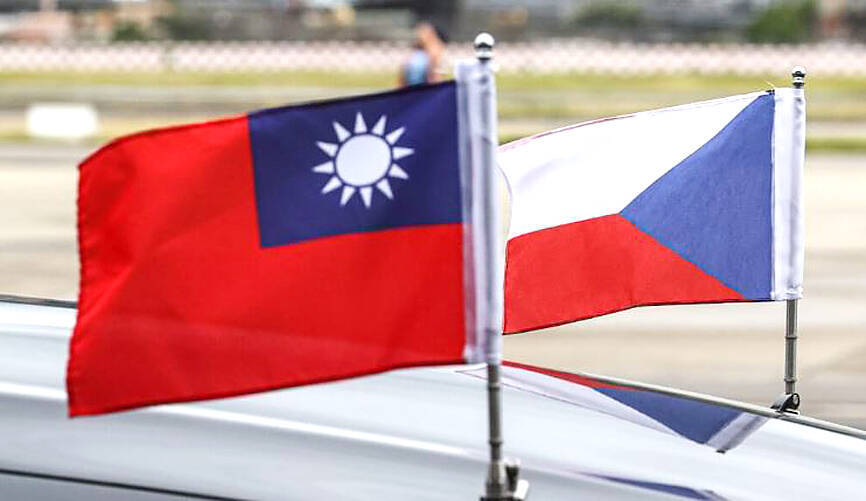Taiwanese citizens would be allowed to work in the Czech Republic without a work permit or employment card beginning early next month, a Czech government minister said.
Czech Environment Minister Petr Hladik on Wednesday reaffirmed that Taiwan would join Prague’s list of non-EU countries whose citizens can freely enter the central European country’s labor market, although he did not specify an exact date.
The measure was approved in December last year.

Photo: CNA
In addition to citizens from EU member countries, citizens of Australia, Japan, Canada, South Korea, New Zealand, the UK, the US, Israel and Singapore have been entitled to work in the Czech Republic since July last year.
Taiwan had initially been set to join the list last year, but could only be added after the Czech Republic changed the law to recognize it as an "independent judicial jurisdiction," rather than a "country," which Prague is unable to do as it observes China’s "one China" policy.
The Czech Ministry of Labor said that the countries on the list are global economic powers, and the Czech Republic seeks long-term cooperation with them.
Exempting Taiwanese jobseekers from work permits would reduce the administrative burden for prospective employers and encourage Taiwanese workers to enter the Czech job market, the ministry said.
However, Taiwanese citizens must still "apply for a residence permit according to standard procedures," according to a Czech government Web site, since "free access to the labor market does not provide foreigners with the right to reside in the territory of the Czech Republic."
According to data from the Czech Ministry of Labor, as of the end of June last year, 185 Taiwanese were working in the country.
Citizens of the Czech Republic currently require a valid work permit to legally work in Taiwan.
There were 108 Czech nationals residing in Taiwan last year, according to data from the National Immigration Agency published in February last year.

The manufacture of the remaining 28 M1A2T Abrams tanks Taiwan purchased from the US has recently been completed, and they are expected to be delivered within the next one to two months, a source said yesterday. The Ministry of National Defense is arranging cargo ships to transport the tanks to Taiwan as soon as possible, said the source, who is familiar with the matter. The estimated arrival time ranges from late this month to early next month, the source said. The 28 Abrams tanks make up the third and final batch of a total of 108 tanks, valued at about NT$40.5 billion

Two Taiwanese prosecutors were questioned by Chinese security personnel at their hotel during a trip to China’s Henan Province this month, the Mainland Affairs Council (MAC) said yesterday. The officers had personal information on the prosecutors, including “when they were assigned to their posts, their work locations and job titles,” MAC Deputy Minister and spokesman Liang Wen-chieh (梁文傑) said. On top of asking about their agencies and positions, the officers also questioned the prosecutors about the Cross-Strait Joint Crime-Fighting and Judicial Mutual Assistance Agreement, a pact that serves as the framework for Taiwan-China cooperation on combating crime and providing judicial assistance, Liang

A group from the Taiwanese Designers in Australia association yesterday represented Taiwan at the Midsumma Pride March in Melbourne. The march, held in the St. Kilda suburb, is the city’s largest LGBTQIA+ parade and the flagship event of the annual Midsumma Festival. It attracted more than 45,000 spectators who supported the 400 groups and 10,000 marchers that participated this year, the association said. Taiwanese Designers said they organized a team to march for Taiwan this year, joining politicians, government agencies, professionals and community organizations in showing support for LGBTQIA+ people and diverse communities. As the first country in Asia to legalize same-sex

MOTIVES QUESTIONED The PLA considers Xi’s policies toward Taiwan to be driven by personal considerations rather than military assessment, the Epoch Times reports Chinese President Xi Jinping’s (習近平) latest purge of the Chinese People’s Liberation Army (PLA) leadership might have been prompted by the military’s opposition to plans of invading Taiwan, the Epoch Times said. The Chinese military opposes waging war against Taiwan by a large consensus, putting it at odds with Xi’s vision, the Falun Gong-affiliated daily said in a report on Thursday, citing anonymous sources with insight into the PLA’s inner workings. The opposition is not the opinion of a few generals, but a widely shared view among the PLA cadre, the Epoch Times cited them as saying. “Chinese forces know full well that